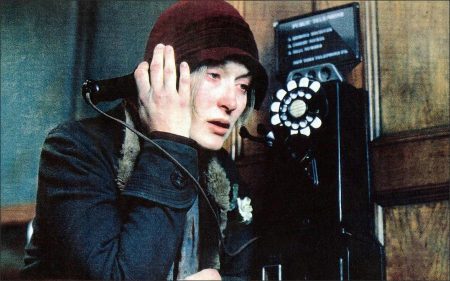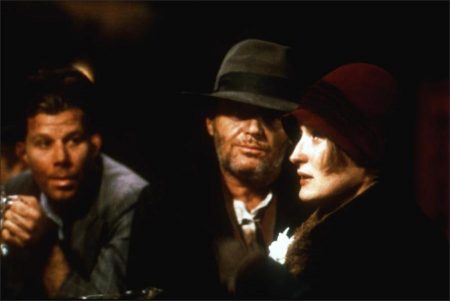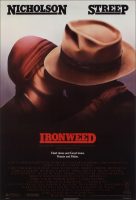Taglines: Hard times and Good times. Francis and Helen.
Ironweed movie synopsis. Albany, New York, Halloween, 1938. Francis Phelan and Helen Archer are bums, back in their birth city. She was a singer on the radio, he a major league pitcher. Death surrounds them: she’s sick, a pal has cancer, he digs graves at the cemetery and visits the grave of his infant son whom he dropped; visions of his past haunt him, including ghosts of two men he killed.
That night, out drinking, Helen tries to sing at a bar. Next day, Fran visits his wife and children and meets a grandson. He could stay, but decides it’s not for him. Helen gets their things out of storage and finds a hotel. Amidst their mistakes and dereliction, the film explores their code of fairness and loyalty.
Ironweed is a 1987 American drama film directed by Héctor Babenco. It is based on the Pulitzer Prize-winning novel of the same name by William Kennedy, who also wrote the screenplay. It stars Jack Nicholson and Meryl Streep, with Carroll Baker, Michael O’Keefe, Diane Venora, Fred Gwynne, Nathan Lane and Tom Waits in supporting roles.
The story concerns the relationship of a homeless couple: Francis, an alcoholic, and Helen, a terminally ill woman during the Great Depression. Major portions of the film were shot on location in Albany, New York, including Jay Street at Lark Street, Albany Rural Cemetery and the Miss Albany Diner on North Broadway. The film was nominated for Academy Awards for Best Actor in a Leading Role (Jack Nicholson) and Best Actress in a Leading Role (Meryl Streep).
Film Review for Ironweed
EARLY in his novel ”Ironweed,” William Kennedy describes a visit made to a cemetery by the aging derelict Francis Phelan, whose mother and father and infant son are buried there. It is Halloween, and they are watching him, interested and bemused, from beyond the grave.
The infant Gerald, who was 13 days old when his father accidentally dropped him 22 years earlier, is a particularly piquant figure, and Mr. Kennedy describes him this way: ”Gerald’s grave trembled with superb possibility. Denied speech in life, having died with only monosyllabic goos and gahs in his vocabulary, Gerald possessed the gift of tongues in death. His ability to communicate and to understand was at the genius level among the dead. He could speak with any resident adult in any language, but more notable was his ability to understand the chattery squirrels and chipmunks, the silent signals of the ants and beetles, and the slithy semaphores of the slugs and worms that moved above and through his earth…
”Gerald rested in his infantile sublimity, exuding a high gloss induced by early death, his skin a radiant white-gold, his nails a silvery gray, his clusters of curls and large eyes perfectly matched in gleaming ebony. Swaddled in his grave, he was beyond capture by visual or verbal artistry. He was neither beautiful nor perfect to the beholder but rather an ineffably fabulous presence whose like was not to be found anywhere in the cemetery, and it abounded with dead innocents.”
Beautiful as this passage is, and as richly phantasmagorial, it comes as close to being entirely unfilmable as anything one might imagine. The same is largely true for the rest of Mr. Kennedy’s book, so much of which takes place inside the mind of Francis Phelan or in the past. The superficial action of Mr. Kennedy’s Pulitzer Prize-winning ”Ironweed” is quite straightforward: in the autumn of 1938, Francis roams the streets of Albany, ekeing out his present-day existence and trying to come to terms with his past. They are exemplifed, respectively, by his fellow derelict and longtime companion Helen and his wife, Annie, whom he abandoned after the baby died but must make his peace with now. Throughout the several days that the novel spans, Francis is also visited by a full panoply of ghosts.
But the real story of the film ”Ironweed,” which opens today at Loews Tower East, isn’t the one that’s on the screen. It’s the tale of how Hector Babenco, the director, captured the harshness and pathos of life among Brazilian street urchins in ”Pixote,” made the brilliant ”Kiss of the Spider Woman” on a shoestring, and thus earned his chance to play for big and, as it turns out, crippling stakes.
or despite its nearly two-and-a-half-hour running time, its superstar cast and its $23 million budget, Mr. Babenco’s ”Ironweed” is skeletal, a mere outline of Mr. Kennedy’s far more resonant book. That Mr. Kennedy himself adapted the novel to the screen is only further evidence of how much more greatly film and literature diverge than those on either side of the fence often imagine.
Though ”Ironweed” is a bleakly handsome, extremely well-acted film, its virtues are almost beside the point. The initial large question -that of why audiences in the market for a big-budget Christmas film should be drawn to anything as downbeat and actionless as this one – is never even addressed, let alone answered. ”Ironweed” just is, that’s all. It has a stubbornness that’s akin to Francis Phelan’s, but a good deal less justifiable.
As Francis Phelan, Jack Nicholson seems seldom to move, except in flashbacks that show Francis as a younger man. It’s a fine performance, very true to the burned-out quality of a man confronting his own failures, but the overall effect is unavoidably glum. Mr. Nicholson makes himself almost unrecognizable at times, behind a grizzled beard and a despairing expression.
And he rises to great heights of panic, of guilt and of self-justifying anger as the various ghosts from Francis’s past come back – literally, wearing white suits – to haunt him. The performance is persuasive, but it’s paralyzed by the absence of many real events in Francis’s present-day story. When the film reunites him with his wife (Carroll Baker), son (Michael O’Keefe) and daughter (Diane Venora), the meeting comes too late in the story to have much impact. Besides, this sequence is made to look far too much like something off a greeting card.
Meryl Streep, as ever, is uncanny. Miss Streep uses the role of Helen as an opportunity to deliver a stunning impersonation of a darty-eyed, fast-talking woman of the streets, an angry, obdurate woman with great memories and no future. There isn’t much more to the film’s Helen than this, and indeed the character may go no deeper, but she’s a marvel all the same. Behind the runny, red-rimmed eyes, the nervous chatter and the haunted expression, Miss Streep is even more utterly changed than her co-star, and she even sings well. The sequence in which Helen entertains the real and imagined patrons of a barroom with a rendition of ”He’s Me Pal” is a standout.
Tom Waits and Jake Dengel are among the actors who play subsidiary derelicts, and it is in these minor characters that the film’s Hollywood side really shows. From the real street children of ”Pixote” to the movie bums who flaunt their down-at-the-heels mannerisms here, Mr. Babenco has surely come too long a way.
Ironweed (1987)
Directed by: Hector Babenco
Starring: Jack Nicholson, Meryl Streep, Carroll Baker, Michael O’Keefe, Diane Venora, Fred Gwynne, Margaret Whitton, Tom Waits, Jake Dengel, Will Zahrn
Screenplay by: William Kennedy
Production Design by: Jeannine Oppewall
Cinematography by: Lauro Escorel
Film Editing by: Anne Goursaud
Costume Design by: Joseph G. Aulisi
Set Decoration by: Leslie A. Pope
Art Direction by: Robert Guerra
Music by: John Morris
Distributed by: TriStar Pictures
Release Date: December 18, 1987
Views: 145






